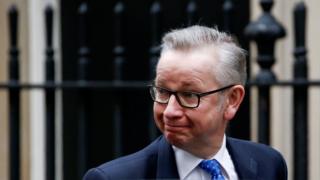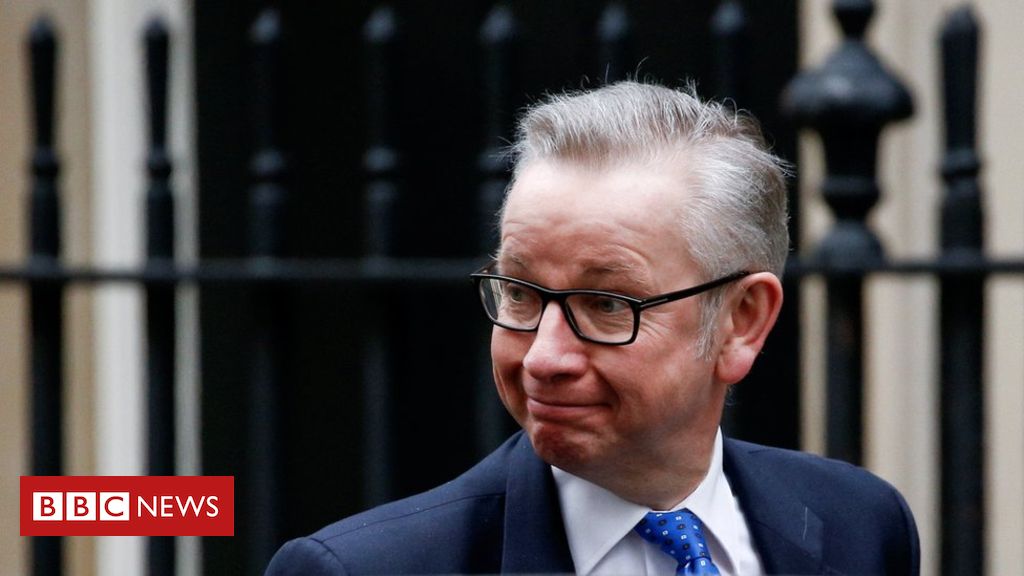 Image copyright
Image copyright
Reuters
Michael Gove is due to enter the race for Tory leader, challenging his former Vote Leave ally Boris Johnson.
It means the two figureheads of the official Leave campaign will battle for the right to steer the Brexit process to a conclusion.
They previously clashed during the 2016 leadership contest, won by Theresa May.
So far, a total of eight candidates have announced they are standing for leader since Mrs May said she would resign on 7 June.
Their positions on a no-deal Brexit are emerging as the “central fault line” says BBC political correspondent Chris Mason.
The former Brexit secretary, Dominic Raab, and former Commons leader Andrea Leadsom revealed their leadership bids in the Sunday newspapers.
They joined Foreign Secretary Jeremy Hunt, International Development Secretary Rory Stewart, Health Secretary Matt Hancock and former Work and Pensions Secretary Esther McVey, in the battle for the leadership.
Mr Gove is expected to present himself as a “unity candidate” as he announces his campaign later on Sunday.
His decision to enter the race echoes the 2016 contest, when he ran against Mr Johnson for the leadership.
Then, he faced allegations of betrayal after withdrawing support from Mr Johnson and running for leader himself, eventually helping to end both men’s chances of becoming prime minister.
All the leadership contenders have strived to make their position on Brexit clear to their electors – the 313 Tory MPs who choose a shortlist and the 124,000 party members who will have the final say.
A dividing line has emerged between candidates like Mr Johnson, who say the UK must be ready to leave the EU on October 31 without a deal, and those who oppose a no-deal Brexit.
Mr Raab said in the Mail on Sunday that the country needed to demonstrate “unflinching resolve to leave”, with or without a deal.
Ms Leadsom said she also supported a no-deal Brexit “if necessary”, telling the Sunday Times, that to succeed in a negotiation “you have to be prepared to walk away”.
‘A tantalising and fascinating contest’
Michael Gove’s declaration will set up a tantalising and fascinating contest between two of the architects of the Leave campaign, who fell out so spectacularly during the contest to replace David Cameron immediately after the referendum three years ago.
Mr Gove was supporting Boris Johnson to be prime minister – until he, “reluctantly but firmly,” as he put it, concluded he himself should stand, and Mr Johnson should stand aside.
This time, the two men will take each other on. But in these opening skirmishes of this campaign, what is emerging as the central fault line is the instincts of the candidates on a no-deal Brexit.
Some are willing to embrace it, others think it would be a disaster. The outlook of the eventual winner could shape our country for years to come.
Ms McVey also told LBC radio that the UK “had to come out” of the EU, and if that was without a deal then “that’s what it’s got to be”.
But other candidates have stressed the need to get a Brexit deal through Parliament.
Mr Hunt told the Sunday Times he had the business experience to secure an agreement. “Doing deals is my bread and butter,” he said.
And in a direct criticism of Boris Johnson, Mr Stewart said: “I would not serve in the cabinet of someone explicitly pushing for a no-deal Brexit.”
Mr Hancock said Mrs May’s successor must be “brutally honest” about the “trade-offs” required to get a deal through Parliament.
Mrs May will continue as prime minister while the leadership contest takes place.
Tory MPs have until the week beginning 10 June to put their name forward, and any of them can stand – as long as they have the backing of two parliamentary colleagues.
The candidates will be whittled down by votes of MPs until two remain, and in July a postal ballot of all party members will be held to decide the winner.
The last leader elected by the membership was David Cameron in 2005. Theresa May was unopposed in 2016.
It will be the first time Conservative members have directly elected a prime minister, as opposed to a leader of the opposition.
